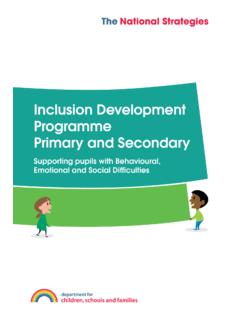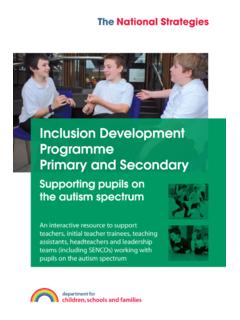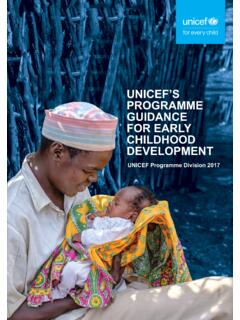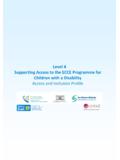Transcription of Inclusion Development Programme - …
1 Inclusion Development ProgrammeSupporting children with Behavioural, Emotional and Social Difficulties:Guidance for practitioners in the Early Years Foundation StageMinimum specificationPCMacCPUP entium III or greaterPowerPC G4 (867 MHz or faster)RAM128 MB512 MBHard drive100 MB space100 MB spaceCD drive24 x speed24 x speedSVGA graphics card16 bit colour16 bit colourMinimum screen resolution1024 x 7681024 x 768 Sound card, speakers, or headphones16 bitStandardKeyboard and mouseYes (Microsoft compatible)YesOperating systemWindows 2000 or laterMac OS X or laterInstructions for running the disk Insert the DVD-ROM into your disk tray. Your computer may automatically run the program if you have a feature called Auto run enabled.
2 If it does not automatically run, use the following steps. For PC users, select My Computer, and then select the disk icon to open. For Mac users, select the disk icon on your desktop to open. Select the file .Adobe Flash Player requirementsThis product uses features in Adobe Flash Player version 9 and later. You cannot use this product without this player. Download the latest version now Development ProgrammeSupporting children with Behavioural, Emotional and Social Difficulties:Guidance for practitioners in the Early Years Foundation StageFirst published in 2010 Ref: 00010-2010 BKT-ENDSI CMM 02-2010 DisclaimerThe Department for Children, Schools and Families wishes to make it clear that the Department and its agents accept no responsibility for the actual content of any materials suggested as information sources in this publication, whether these are in the form of printed publications or on a these materials, icons, logos, software products and websites are used for contextual and practical reasons.
3 Their use should not be interpreted as an endorsement of particular companies or their websites referred to in these materials existed at the time of going to check all website references carefully to see if they have changed and substitute other references where National Strategies | Early Years IDP: Supporting children with Behavioural, Emotional and Social Difficulties Guidance for practioners in the Early Years Foundation Stage Crown copyright 201000010-2010 BKT-ENContentsIntroduction3 How to use these materials4 Terminology, definitions and implications6A Unique Child8 Positive Relationships16 Enabling Environments23 Learning and Development33 Appendix41 Further reading and additional materials523 The National Strategies | Early Years IDP.
4 Supporting children with Behavioural, Emotional and Social Difficulties Guidance for practioners in the Early Years Foundation Stage Crown copyright 201000010-2010 BKT-ENIntroductionWhat is the Inclusion Development Programme ?The Inclusion Development Programme (IDP) is part of the government s strategy for children with special educational needs (SEN), outlined in Removing barriers to achievement: the government s strategy for SEN (DfES 0117/2004). This four-year Programme (2008 11) will provide support materials for teachers and practitioners working with children with a range of SEN of all ages, in settings from Early Years through to IDP aims to: build the independent capacity of schools and settings by helping teachers and practitioners to develop the skills needed for the early identification of children with high incidence needs.
5 Strengthen leadership and strategic approaches to Inclusion and achievement of children with high incidence needs by providing guidance and support for special educational needs coordinators (SENCOs), leaders and is the focus of this Early Years IDP?This is the third booklet in the IDP series and it focuses on supporting all children in developing behavioural, emotional and social skills, thus avoiding later difficulties in learning and Development . It also helps practitioners who are working with children whose behaviour, emotional and social Development is already causing concern. In addition to this booklet there is a linked DVD and web-based e-learning previous booklets in this series are: Supporting children with speech, language and communication needs: Guidance for practitioners in the Early Years Foundation Stage; Supporting children on the autism spectrum: Guidance for practitioners in the Early Years Foundation complete IDP materials can be downloaded from the National Strategies website: between IDP and other materialsHow do these materials fit with the following: Early Years Foundation Stage (EYFS); Social and emotional aspects of Development (SEAD).
6 Social and emotional aspects of learning (SEAL).The Early Years Foundation StageThe EYFS is the statutory framework for all those working with children from birth to five (DCSF, 2008) which sets out the principles and practice required for effective provision. The IDP materials provide detailed support for practitioners to give due consideration to children s behavioural, emotional and social needs in their implementation of the EYFS. The EYFS package (booklets, posters, cards and CD: DCSF 00261-2008 PCK-EN) should be used alongside these materials. The EYFS principles, requirements and effective practice guidance underpin the Early Years IDP, and you should refer to them as you work through the materials: they provide a wealth of additional guidance on effective National Strategies | Early Years IDP.
7 Supporting children with Behavioural, Emotional and Social Difficulties Guidance for practioners in the Early Years Foundation Stage00010-2010 BKT-EN Crown copyright 2010 Social and emotional aspects of Development (SEAD)Materials consist of a booklet for practitioners (DCSF 00707-2008 BKT-EN), CD-ROM (DSCF 00840-2008 CDO-EN) and booklet for local authority trainers (DCSF 00708-2008 BKT-EN).These materials are intended as training materials to support continuing professional Development (CPD) for practitioners at individual, group or local authority level. The materials provide suggestions, case study examples and information to support practitioners to develop more effective practice in supporting children s personal, social and emotional and emotional aspects of learning (SEAL)SEAL is a whole-school Programme that supports practitioners to help children develop social and emotional skills.
8 The SEAL folder is reproduced on the SEAD CD and the materials include a range of ideas for assemblies, staff Development and learning opportunities guidance, information and SEAD and SEAL support practitioners in implementing all the principles of the EYFS, particularly Positive Relationships and the personal, social and emotional area of learning and Development . The IDP supports these principles and the EYFS commitment to inclusive practice. Inclusion is not optional: children have defined entitlements in this area and settings have legal responsibilities. (EYFS Statutory Framework, )How to use these materialsNote: Where this booklet refers to parents or mothers, fathers and carers these terms are intended to include any significant carers step-parents, adoptive parents, materials provide more detailed information and examples of effective practice to support children whose behavioural, emotional and social Development is causing concern.
9 Through each theme of the EYFS this booklet identifies underpinning knowledge which may help practitioners to extend their understanding of children s behavioural, emotional and social Development . Both the booklet and the e-learning module provide practical suggestions, examples of effective practice and prompts for reflection to help practitioners develop realistic expectations of children s behaviour. This booklet and the e-learning module should be used in a group with colleagues to form the basis of CPD sessions. The materials can also be used by individual practitioners. The e-learning module reflects the content of the booklet and provides a further opportunity to reflect and develop your practice through the use of video examples and are offered to encourage a professional problem-solving approach to concerns about children s behavioural, emotional and social behavioural, emotional and social Development is such a complex topic and each individual situation is different, these materials are not able to provide off the shelf solutions to respond to children s behaviour.
10 However, the materials do show how effective practice and high-quality care with positive interactions will give children the best possible National Strategies | Early Years IDP: Supporting children with Behavioural, Emotional and Social Difficulties Guidance for practioners in the Early Years Foundation Stage Crown copyright 201000010-2010 BKT-ENIs the IDP suitable for all practitioners?The IDP is intended for all practitioners but also takes account of the particular roles some have in supporting colleagues and families such as: key person childminders special educational needs coordinators (SENCO) or behaviour coordinators leaders and practitioners play a significant role in influencing children s developing understanding of how people relate to each other.







